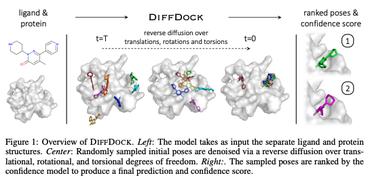Search Results for author: Lihang Liu
Found 11 papers, 5 papers with code
HelixFold-Multimer: Elevating Protein Complex Structure Prediction to New Heights
no code implementations • 16 Apr 2024 • Xiaomin Fang, Jie Gao, Jing Hu, Lihang Liu, Yang Xue, Xiaonan Zhang, Kunrui Zhu
While monomer protein structure prediction tools boast impressive accuracy, the prediction of protein complex structures remains a daunting challenge in the field.
Pre-Training on Large-Scale Generated Docking Conformations with HelixDock to Unlock the Potential of Protein-ligand Structure Prediction Models
no code implementations • 21 Oct 2023 • Lihang Liu, Donglong He, Xianbin Ye, Jingbo Zhou, Shanzhuo Zhang, Xiaonan Zhang, Jun Li, Hua Chai, Fan Wang, Jingzhou He, Liang Zheng, Yonghui Li, Xiaomin Fang
In this work, we show that by pre-training a geometry-aware SE(3)-Equivariant neural network on a large-scale docking conformation generated by traditional physics-based docking tools and then fine-tuning with a limited set of experimentally validated receptor-ligand complexes, we can achieve outstanding performance.
GEM-2: Next Generation Molecular Property Prediction Network by Modeling Full-range Many-body Interactions
1 code implementation • 11 Aug 2022 • Lihang Liu, Donglong He, Xiaomin Fang, Shanzhuo Zhang, Fan Wang, Jingzhou He, Hua Wu
Full-range many-body interactions between electrons have been proven effective in obtaining an accurate solution of the Schr"odinger equation by classical computational chemistry methods, although modeling such interactions consumes an expensive computational cost.
HelixFold-Single: MSA-free Protein Structure Prediction by Using Protein Language Model as an Alternative
1 code implementation • 28 Jul 2022 • Xiaomin Fang, Fan Wang, Lihang Liu, Jingzhou He, Dayong Lin, Yingfei Xiang, Xiaonan Zhang, Hua Wu, Hui Li, Le Song
Our proposed method, HelixFold-Single, first pre-trains a large-scale protein language model (PLM) with thousands of millions of primary sequences utilizing the self-supervised learning paradigm, which will be used as an alternative to MSAs for learning the co-evolution information.
HelixADMET: a robust and endpoint extensible ADMET system incorporating self-supervised knowledge transfer
no code implementations • 17 May 2022 • Shanzhuo Zhang, Zhiyuan Yan, Yueyang Huang, Lihang Liu, Donglong He, Wei Wang, Xiaomin Fang, Xiaonan Zhang, Fan Wang, Hua Wu, Haifeng Wang
Additionally, the pre-trained model provided by H-ADMET can be fine-tuned to generate new and customised ADMET endpoints, meeting various demands of drug research and development requirements.
LiteGEM: Lite Geometry Enhanced Molecular Representation Learning for Quantum Property Prediction
1 code implementation • 28 Jun 2021 • Shanzhuo Zhang, Lihang Liu, Sheng Gao, Donglong He, Xiaomin Fang, Weibin Li, Zhengjie Huang, Weiyue Su, Wenjin Wang
In this report, we (SuperHelix team) present our solution to KDD Cup 2021-PCQM4M-LSC, a large-scale quantum chemistry dataset on predicting HOMO-LUMO gap of molecules.
ChemRL-GEM: Geometry Enhanced Molecular Representation Learning for Property Prediction
no code implementations • 11 Jun 2021 • Xiaomin Fang, Lihang Liu, Jieqiong Lei, Donglong He, Shanzhuo Zhang, Jingbo Zhou, Fan Wang, Hua Wu, Haifeng Wang
Recent advances in graph neural networks (GNNs) have shown great promise in applying GNNs for molecular representation learning.
 Ranked #2 on
Molecular Property Prediction
on ToxCast
Ranked #2 on
Molecular Property Prediction
on ToxCast
Molecular Representation Learning by Leveraging Chemical Information
1 code implementation • NA 2021 • Weibin Li, Shanzhuo Zhang, Lihang Liu, Zhengjie Huang, Jieqiong Lei, Xiaomin Fang, Shikun Feng, Fan Wang
As graph neural networks have achieved great success in many domains, some studies apply graph neural networks to molecular property prediction and regard each molecule as a graph.
 Ranked #6 on
Graph Property Prediction
on ogbg-molhiv
Ranked #6 on
Graph Property Prediction
on ogbg-molhiv
MBCAL: Sample Efficient and Variance Reduced Reinforcement Learning for Recommender Systems
no code implementations • 6 Nov 2019 • Fan Wang, Xiaomin Fang, Lihang Liu, Hao Tian, Zhiming Peng
The proposed method takes advantage of the characteristics of recommender systems and draws ideas from the model-based reinforcement learning method for higher sample efficiency.
Sequential Evaluation and Generation Framework for Combinatorial Recommender System
1 code implementation • 1 Feb 2019 • Fan Wang, Xiaomin Fang, Lihang Liu, Yaxue Chen, Jiucheng Tao, Zhiming Peng, Cihang Jin, Hao Tian
On the one hand of this framework, an evaluation model is trained to evaluate the expected overall utility, by fully considering the user, item information and the correlations among the co-exposed items.
Unsupervised Deep Domain Adaptation for Pedestrian Detection
no code implementations • 9 Feb 2018 • Lihang Liu, Weiyao Lin, Lisheng Wu, Yong Yu, Michael Ying Yang
This paper addresses the problem of unsupervised domain adaptation on the task of pedestrian detection in crowded scenes.






